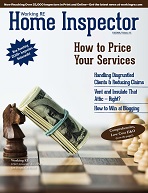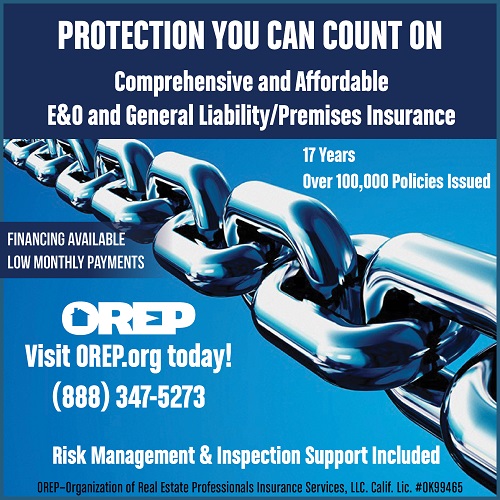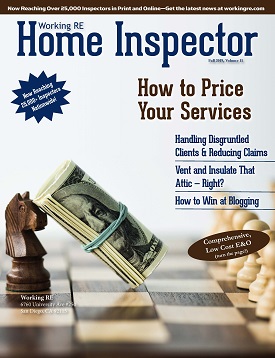 |
> E&O/GL Insurance for Home Inspectors Competitive Rates, Broad Coverage, Free Risk Management, online inspection support for tough questions, discounts on education and more… Professional Coverage, Competitive Pricing Shop OREP today! |
Editor’s Note: The New Jersey Consumer Fraud Act allows monetary penalties for violators, but exempts “learned professionals,” with the theory being that because these professions have testing, licensing and regulatory requirements, the consumer is adequately protected by these existing safeguards.
Inspectors and the New Jersey Consumer Fraud Act
by Craig W. Alexander, Esq.
The home inspection is a well-established part of the homebuying process. Buyers rely upon the inspection to identify problems with the dwelling before the closing, and the inspection report forms the basis for demanding repairs or credits. Together with mortgage brokers, inspectors are an integral part of the residential real estate team, and most real estate agents have a list of preferred inspectors to recommend to their clients. The Appellate Division in the State of New Jersey has recently ruled, however, that despite their expertise and professional status, home inspectors are not “learned professionals” entitled to exemption from liability under New Jersey’s Consumer Fraud Act (CFA). It is a distinction that has significant ramifications to the home inspection industry.
The CFA is remedial legislation intended to protect consumers and prevent consumer fraud. The Attorney General has the authority to enforce the CFA, but there is also a private cause of action that can result in an award of treble damages and attorney’s fees. Claims arising under the CFA include fraudulent billing practices, false advertising, and misrepresentations of material business issues. There is, however, a judicially-created exception to the CFA for “learned professionals,” such as physicians and attorneys. The exception is significant because it protects those professionals from private CFA claims and the potential exposure of treble damages and legal fees.
In Shaw v. Shand, a home inspector failed to identify some problems with the home in the inspection report. After closing, the buyers discovered the problems and incurred substantial repair costs. The buyers sued the inspector under the CFA, and the inspector claimed that as a “semi-professional” he was exempt from liability under the CFA. The Appellate Division in the State of New Jersey concluded that home inspectors are subject to the CFA and that the “learned professional” exemption does not apply.
Opinion does not mean home inspectors are not qualified, as they do operate as a regulated profession. Some inspectors are regulated by the Attorney General’s Division of Consumer Affairs and they must be licensed under the Home Inspection Licensing Act. To be licensed in New Jersey, an inspector must serve 40 hours of apprenticeship with a licensed home inspector and then pass a State-mandated test. A home inspector must keep his license in good standing in order to engage in the home inspection business in New Jersey.
(story continues below)
Notwithstanding the training and licensure requirements, the court concluded that home inspection is not a profession requiring extensive “learning or erudition.” To be licensed, a home inspector requires only a high school diploma or its equivalent. The court declared that while a home inspector may be a semi-professional, it is not a “learned professional.” This distinction is important because the court also determined that the judicially created exception to the CFA for learned professionals should not be extended to semi-professionals. As a result, home inspectors will continue to face exposure for treble damages and legal fees from private litigants under the CFA.
The court’s opinion is a warning to home inspectors to consider how to better protect themselves from liability. Home inspectors should have engagement letters that clearly outline their scope of work. If a buyer attends the inspection, the inspector should patiently and carefully explain the findings to the buyer. The inspector should also prepare a comprehensive written report, with all potential problems reflected in the report as well as recommendations for further evaluation by specialists. Additional training and education should be implemented. Inspectors should also consult with insurance brokers and attorneys to determine appropriate levels of coverage and to refine the documents utilized in the inspection process. While high-quality service and effective communication may ultimately be the best safeguard against liability, home inspectors — like any professional — should nonetheless act prudently to manage the risks inherent in their industry, and the threat of treble damages under the CFA demands constant care and attention.
Free Risk Management Online Course Claims and Complaints: How to Stay Out of Trouble
Available Now
Presenter: David Brauner, Senior Insurance Broker OREP
David Brauner, Senior Broker at OREP, shares insights and advice gained over 25+ years of providing E&O insurance for inspectors, showing you how to protect yourself and your business. Watch Now!
About the Author
Craig Alexander is a member of Mandelbaum Barrett P.C’s Real Estate practice group headquartered in Roseland, NJ. His practice focuses on real estate transactions in all asset classes (multi-family, retail, office and industrial) including land development, financing, leasing, zoning, 1031 exchanges, construction, and deal and partnership structuring.
Note: The Fall 2019 issue of Working RE Inspector is mailing now to over 25,000 home inspectors nationwide. OREP Insureds enjoy guaranteed delivery of each print magazine and many more benefits.




by Ron Greene
I would challenge the NJ court’s claim that inspectors are not a learned professional. The acid test is whether or not appraisers are considered “learned professionals.” If they are, the same consideration should be extended to inspectors, since both are required to demonstrate similar levels of proficiency with similar subject complexities, and pass a state exam. This law should be challenged as being discriminatory by nature.
-